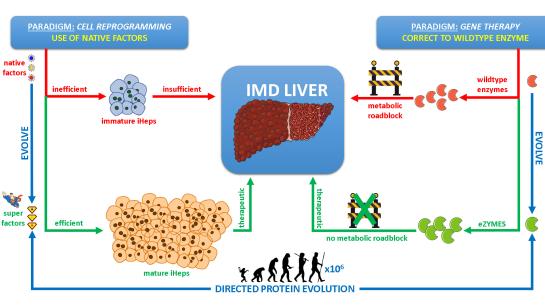Inherited metabolic disorders (IMD) of the liver are a heterogeneous group of rare diseases caused by a single defective enzyme in a metabolic pathway of hepatocytes. This often leads to the accumulation of toxic metabolites and the highly specific destruction of liver cells. For some IMD, simply replacing or correcting the deficient enzyme in a subset of hepatocytes is not sufficient to provide a cure due to the cell-autonomous pathophysiology of the disease.
Major advancements in the treatment of IMD are currently hampered by two important paradigms (see schematic).

In this research track we develop solutions to these problems by implementing a versatile technology called “directed protein evolution”. This technology allows to artificially accelerate evolution by more than six orders of magnitude through iterative rounds of smart mutagenesis and selection, resulting in new proteins with superior properties.
Research into a cure for AKU was recently featured for on the AKU Society Blog, where Prof. Joery De Kock explained his exciting research to their AKU patient support community
Publications
- A robust bacterial assay for high-throughput screening of human 4-hydroxyphenylpyruvate dioxygenase inhibitors (2019)
- Prof. Joery De Kock explains his exciting research into a cure for Alkaptonuria (AKU) for the AKU Society Blog
Current projects
led by Joery De Kock
- Preclinical development of a novel gene-based therapy for hereditary tyrosinemia type 1 (398.45 KB) "pdf"
- Biomarker discovery and advanced monitoring of new cell and gene-based therapies for hereditary tyrosinemia type 1 (398.52 KB) "pdf"
- EvolvAKUre: a Darwinian approach to develop a cure for alkaptonuria (401.12 KB) "pdf"
